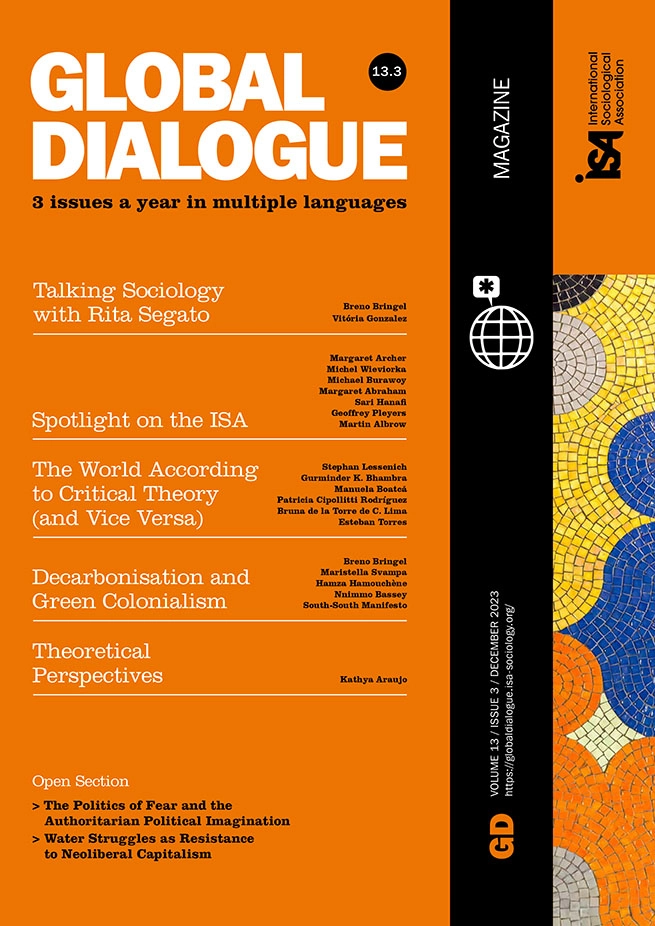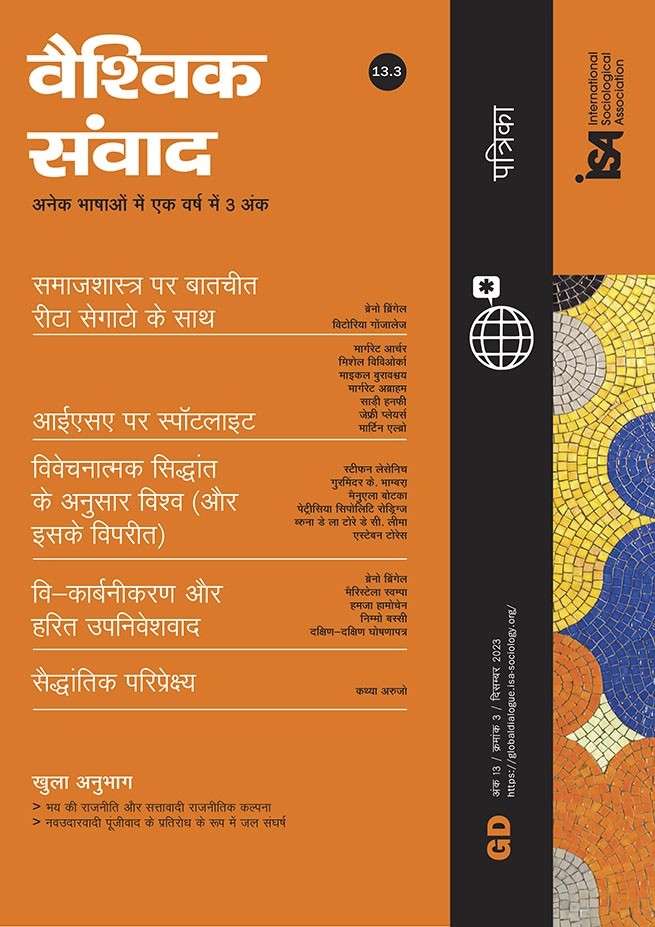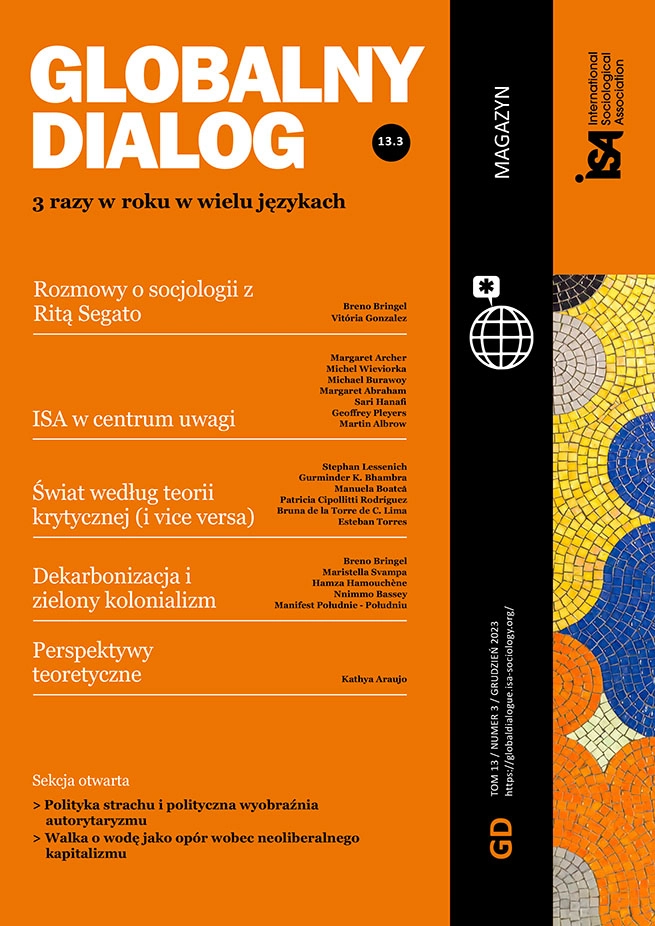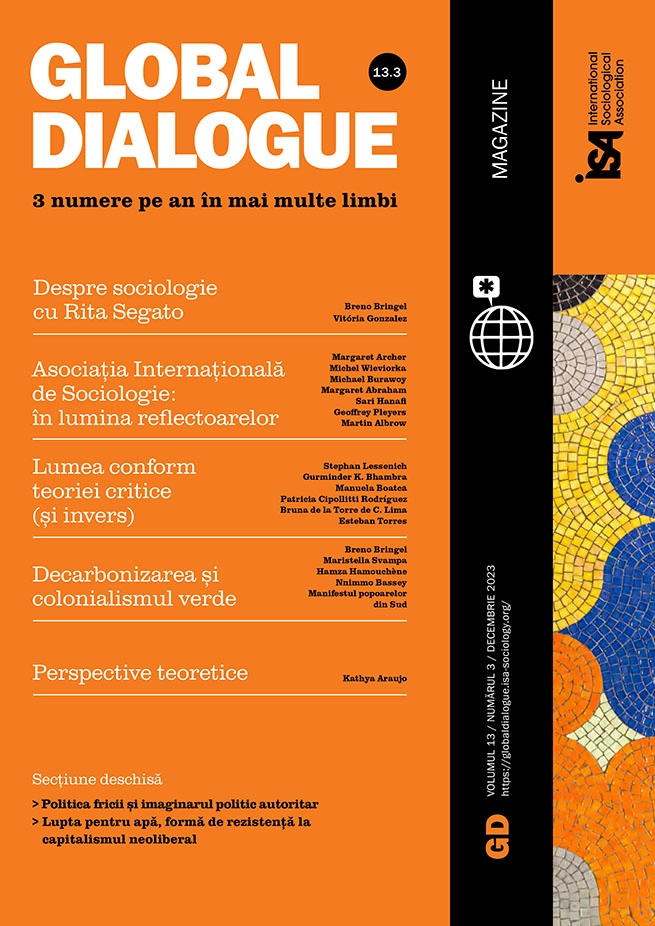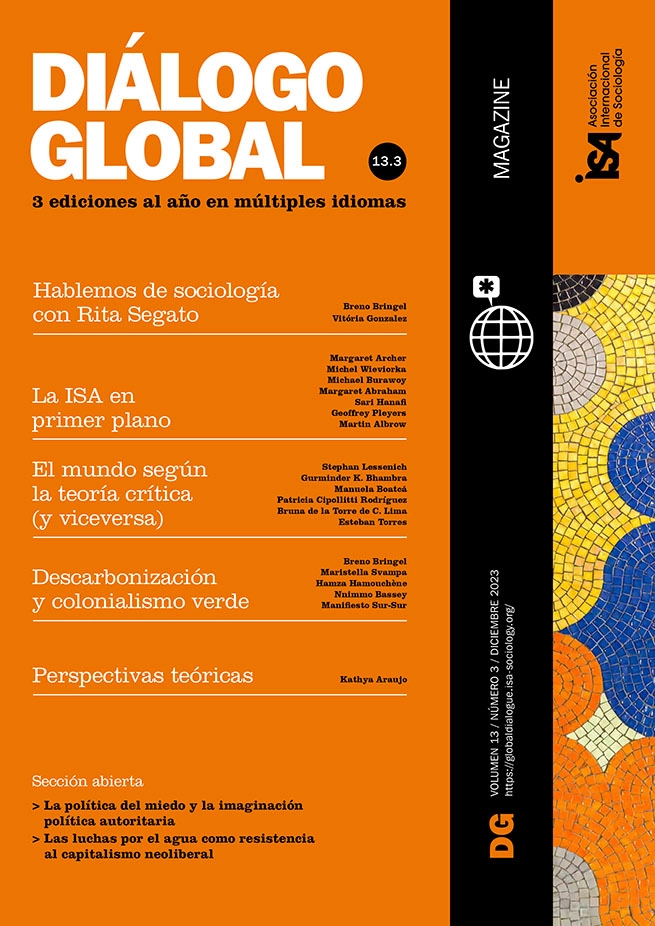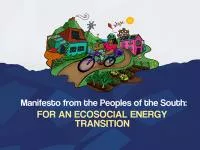The Decarbonisation Consensus

November 15, 2023
In recent years, the socio-ecological transition has moved from being an issue restricted to activist groups and scientists to a central focus of contemporary political and economic agendas. However, two important questions arise here. First, in the face of the urgency of decarbonisation, there is a tendency to reduce the socio-ecological transition – an integral understanding of which should encompass the energy, production, food, and urban levels – to the energy transition. The second issue concerns how the energy transition is carried out and who will pay the costs.
The energy transition, driven mainly by big corporations and governments in the Global North towards supposedly “clean” energy, is increasing pressure on the Global South. For China, the US and Europe to move towards de-fossilisation, new sacrifice zones are being created in the global peripheries. There are several examples of this dynamic: the extraction of cobalt and lithium for the production of high-tech batteries for electric cars brutally affects the so-called “lithium triangle” in Latin America and North Africa; the growing demand for balsa wood, abundant in the Ecuadorian Amazon, for the construction of wind turbines demanded by China and European countries destroys communities, territories, and biodiversity; or the new bidding for mega-projects for solar panels and hydrogen infrastructure further increases land grabbing.
This process is becoming known in activism and critical scholarship as “green extractivism” or “energy colonialism”: a new dynamic of capitalist extraction and appropriation of raw materials, natural goods and labour, especially in the Global South (though not exclusively), for the green energy transition. Energy colonialism is the centrepiece of a new capitalist consensus, which we will define as the decarbonisation consensus.
What is the decarbonisation consensus?
The decarbonisation consensus is a new global agreement that advocates a shift from a fossil fuel-based energy system to a carbon-free (or low-carbon) one based on "“renewable” energies. Its leitmotiv is the fight against global warming and the climate crisis, stimulating an energy transition promoted by the electrification of consumption and digitalisation. This consensus is based on a widely accepted common goal. Who could oppose decarbonisation and climate neutrality in a world wounded by collapse? The main issue is not what to do, but how to do it.
The aims of this hegemonic decarbonisation do not include the deconcentration of the energy system, care for nature, or global climate justice, but other motivations such as attracting new financial incentives, reducing the energy dependence of some countries, expanding market niches or improving the image of companies. Decarbonisation is not seen as part of a broader process of changing the metabolic profile of society (its patterns of production, consumption, circulation of goods, and waste generation) but as an end in itself. Although the seriousness of the climate emergency is recognised, current policies are not only insufficient but also have severe negative impacts, given that the exploitation of natural resources is intensifying and the ideology of indefinite economic growth is being maintained.
The decarbonisation consensus continuously mobilises the discourse of technological potential and innovation. At the same time, it explicitly advocates “green business”, “climate finance”, “nature-based solutions”, “climate-smart mining”, “carbon markets”, and various forms of speculative investment. In short, a type of transition is proposed based on a fundamentally mercantile logic and with a hyper-digitised interface, generating new commodities and sophisticated forms of social and territorial control.
Under another twist of the rhetoric of “sustainability”, a new phase of environmental dispossession of the Global South is emerging, affecting the lives of millions of human beings and non-human sentient beings, further compromising biodiversity, and destroying strategic ecosystems. The Global South once again becomes a storehouse of supposedly inexhaustible resources, from which strategic minerals are extracted for the energy transition of the Global North, as well as a destination for the waste and pollution generated by this new “industrial revolution”.
Green colonialism and the double bind
The decarbonisation consensus is marked by ecological imperialism and green colonialism. It mobilises not only practices but also a neo-colonial ecological imaginary. For example, governments and companies often use the idea of “empty space” typical of imperial geopolitics. If in the past this idea, which complements the Ratzellian notion of “living space” (Lebensraum), generated ecocide and indigenous ethnocide – later serving to promote policies of “development” and “colonisation” of territories – today it is used to justify territorial expansionism for investment in “green” energy.
In this way, large tracts of land in sparsely populated rural areas are considered “empty spaces” suitable for constructing windmills or hydrogen plants. These geopolitical imaginaries of corporate transitions reproduce colonial relations, which cannot only be seen as an imposition from the outside in, from the North to the South. In many cases, what is at stake is also a kind of “internal green colonialism”, which forges the conditions of possibility for the advance of green extractivism based on colonial alliances and relations between domestic elites and global elites. We must also recognise that in the name of the “green transition”, the decarbonisation consensus also generates pressures on the Global North’s territories. Still, this differs from the impacts and scale of such processes in the globalised periphery.
Moreover, the temporality and the way the decarbonisation consensus is implemented trigger contradictions even among its promoters. The worsening of schizophrenic behaviours and policies – or the double bind, to use Gregory Bateson’s term (see his book Steps to an Ecology of Mind) – seems to be a sign of the civilisational polycrisis. There are those who, while recognising its importance, seek to delay decarbonisation by extracting every last drop of oil, as is the case with many fossil fuel companies and their lobbying of governments. One example was the announcement by US President Joe Biden, who, going back on his election promise, in March 2023 approved the Willow Project which allows the expansion of the oil frontier in the Alaskan Arctic to move forward, thereby endangering a highly fragile ecosystem that is already suffering from the melting of ice due to global warming. Another example comes from the European Union which, while seeking to expand the European Green Pact, opted to return to coal in mid-2022, using the energy crisis accelerated by the war in Ukraine as a pretext.
The decarbonisation consensus restricts the horizon of the fight against climate change to what Brazilian researcher Camila Moreno defines as the carbon metric: a limited way of quantifying carbon only based on CO2 molecules, which offers a kind of currency for international exchange, generating the illusion that something is being done against environmental degradation. In this way, the underlying problem is covered up and not only do we continue to pollute, but pollution itself has become a new arena for business (through, for example, emissions offset trading). The natural and ecological limits of the planet continue to be ignored, as no amount of lithium or critical minerals will suffice unless mobility models and consumption patterns are changed.
Therefore, the transition cannot be reduced to solely a change in the energy matrix, guaranteeing the continuity of an unsustainable model. By proposing a short-range corporate energy transition, the decarbonisation consensus maintains the hegemonic development pattern and accelerates the metabolic fracture to preserve current lifestyles and consumption, especially in the countries of the North and the wealthiest sectors of the global economy. The kind of post-fossil logic promoted by the decarbonisation consensus thus leads to a corporate, technocratic, neo-colonial, and unsustainable transition.
Continuities with previous capitalist consensuses: inevitability, corporate capture, and extractivism
Let us look at the decarbonisation consensus from the perspective of the socio-historical process. We see continuities with the previous capitalist consensuses, namely the Washington consensus and the commodities consensus. The first is the discourse of inevitability, which states that there is no alternative to these consensuses. The commodities consensus, for instance, was built on the idea that there was agreement on the irrevocable nature of the extractivist dynamic resulting from the growing global demand for raw materials, aiming to close off the possibility of other alternatives. Similarly, the decarbonisation consensus today seeks to forge the idea that, given the climate urgency, there is no other possible transition and that the only “realistic” one is the corporate transition.
Second, all these consensuses imply a large concentration of power in the hands of non-democratic actors (large corporations, financial actors and international organisations), thereby undermining any possibility of democratic governance, even more so in a context of “transition”. There are two implications of this trend. On the one hand, we see the corporate capture of governance spaces; arenas such as the Conference of Parties (COP), which, as the supreme body of the United Nations Framework Convention on Climate Change, should be a multilateral forum to advance the fight against climate change, instead are increasingly a business fair of green capitalism that maintains energy power relations between North and South. On the other hand, there is an intense concentration of power among large companies from the beginning to the end of the global chains.
Third, the constant search for the expansion of capitalist frontiers involves promoting mega-projects aimed at controlling, extracting, and exporting natural resources. To this end, there is a clear commitment to guarantee “legal security” for capital with regulatory and legal bases that enable the highest corporate profitability. For example, the new bilateral trade agreements the European Union (EU) is negotiating have incorporated chapters on energy and raw materials, to guarantee access to critical minerals for the transition. In this context, the EU recently presented a proposal for a Critical Raw Materials Regulation (CRMR), ostensibly aimed at ensuring a secure and sustainable supply of critical raw materials for the EU. However, as explained in a SOMO report, the proposed EU strategy will not lead to a sustainable supply of critical minerals for Europe, as it will exacerbate risks to human rights and the environment, undermine economic dynamics in partner countries, and continue to reinforce unsustainable consumption in rich countries.
New features: inter-imperial competition, energy security and climate colonialism
Beyond these lines of continuity, there are also novelties. An essential feature of the decarbonisation consensus is the complexity of neo-colonial relations in a multipolar world, marked by inter-imperial competition. It is not only the European Union, lacking critical minerals, which is seeking direct access to them. Despite having them, China is very well positioned in the Global South where for almost two decades it has been making aggressive investments in strategic extractive sectors, maintaining a different type of relationship from that of the United States and Europe.
One of the peculiarities of the new dependence that China is generating on Latin American and African countries, where it is the leading trading partner with almost all of them, is that although its investments are long-term and in different sectors (agribusiness, mining, oil, or infrastructure linked to extractive activities), in terms of technology transfer – particularly concerning the green transition – it tends to use cutting-edge Chinese technology, which sometimes also includes Chinese labour.
The inter-imperial bidding is completed with the United States. Although these issues seem to be absent from State Department statements, on several occasions the head of the Southern Command, Laura Richardson, has made clear the strategic interest the United States has in South America (in terms of water, oil, and lithium, among others). Finally, let us add that Russia, as a tendentially hegemonic actor in a multipolar world, is far from having the reach of the aforementioned powers in the field of the dispute over the energy transition.
Another significant distinguishing element between these three consensuses is the role of the state. We know that a minimal state logic marked the Washington consensus, and the commodity consensus upheld a moderately regulatory state but in close alliance with transnational capital. In turn, the decarbonisation consensus seems to inaugurate the emergence of a new type of planning neo-statism – in some cases closer to an eco-corporate state – that combines green transition with the promotion of public–private funds and the financialisation of nature. Green transitions driven by government institutions and the state tend to approach, facilitate, and merge with corporate transitions in a dynamic of public sector submission to private interests. However, in some cases with intense protest cycles, the state may seek to regain relative autonomy by promoting eco-social transitions that encourage decentralisation and deconcentration of corporate power.
Likewise, although the commodities consensus and the decarbonisation consensus have an extractivist logic, the range of products and minerals required has broadened. In the first case, they are fundamentally food products, hydrocarbons, and minerals such as copper, gold, silver, tin, bauxite, and zinc; while in the second, in addition, the focus of interest is on the so-called critical minerals needed for the energy transition, such as lithium, cobalt, graphite, and indium, among others, as well as rare earths. In both cases, the extraction and export of raw materials have catastrophic consequences in terms of ecological destruction and generation of dependency. However, a crucial aspect that differentiates green extractivism from prior extractivism is the discourse used to legitimise it, as the actors promoting it claim that it is sustainable and the only possible way to address the climate emergency.
In sum, it is essential to grasp the shifts in meaning that the climate and ecological question has undergone in recent years. Beyond the classic enemies, the decarbonisation consensus is emerging as a more complex and sophisticated framework that social movements and alternatives must confront and deal with.
Breno Bringel, Rio de Janeiro State University, Brazil, and Universidad Complutense de Madrid, Spain <brenobringel@iesp.uerj.br> / Twitter: @brenobringel
Maristella Svampa, CONICET and Centro de Documentación e Investigación de la Cultura de Izquierdas, Argentina <maristellasvampa@gmail.com> / Twitter: @SvampaM





